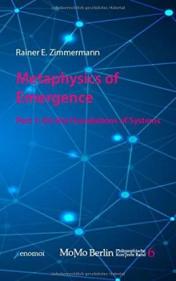Rainer E. ZIMMERMANN
METAPHYSICS OF EMERGENCE
PART 1: ON THE FOUNDATIONS OF SYSTEMS
Published in 2015 by Xenomoi Verlag, 272 pp.
This constitute a first part of what our colleague Rainer Zimmermann has been teaching us regarding the understanding of complexity, networks, systems, space and, of course, information as key concept of the dynamics of emergence. Among his reflections we can find relevant conclusions to the interdisciplinary conceptual and theoretical elucidation we are striving for through our glossariumBITri. You can find in this work a further elaboration of seminars, articles and contributions to congress in which BITrum has been involved for the last 5 years.
In fact, the theory of (emergent complex) systems as a recently more forthcoming (and somewhat reformed) discipline in its own right has been object of acute and intensive discussion and of a rather dynamical evolution, respectively, for quite some while. Unfortunately, this still ongoing discussion has not been very successful so far as to clarifying the most elementary and fundamental issues of definition and the consequences derived there-from. This is mainly because the otherwise welcome interdisciplinary discourse has been dominated originally by protagonists from the fields of economics, management, and the social sciences, in the first place, rather than by those of the more formalized sciences such as physics. However, the degree of universality of a theory is likely to increase with its connectivity to mathematics. Hence, in order to obtain a self-consistent theory of systems that displays a sufficient coherence with a view to its respective lexicology, syntax, and semantics, it is necessary to perform an explicit embedding into available formalisms of mathematical type such that its specific contextuality can be immediately reflected within the given frame of what is already known about the structure and evolution of nature. This motivation underlies this present project which can be understood as a survey on systems in terms of a suitable metaphysics of emergence. The mathematically based explication of systems is the first step (and thus constitutes the first volume) of a panoramatic approach to what we euphemistically call the world. But we shall bear in mind what the important point is after all: To look for the possibilities of grasping experience whilst recognizing that experience is always more than what can be said about it.




